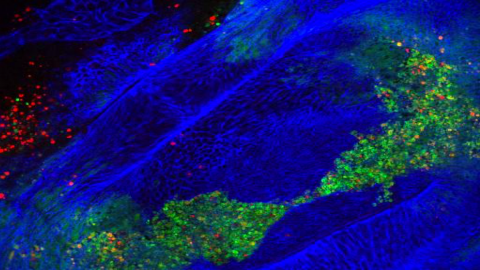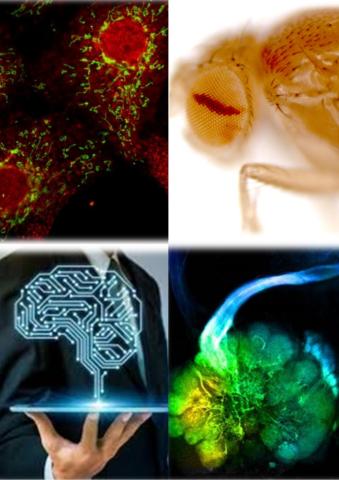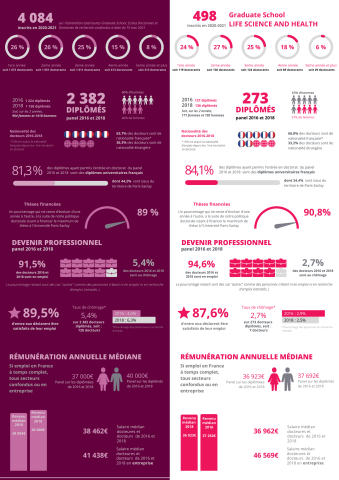
PhD PROGRAM LIFE SCIENCES AND HEALTH - GRADUATE SCHOOL LIFE SCIENCES AND HEALTH
The doctoral program Life Sciences and Health is based on the three doctoral schools Biosigne, CBMS and SDSV. It covers all aspects of biology from the molecular level to organisms. It aims to address, through experimental and/or in silico approaches, questions concerning the structure and molecular mechanisms of living organisms from the most fundamental aspects to applications. Those apply to the field of environment, biotechnologies and health, for example cancer, immune response and neurological and neurodegenerative diseases. It also encompasses projects concerning the evolution of living organisms.
It is structured around fundamental translational and clinical research in all areas of :
oncology / biochemistry / cell biology / developmental biology / molecular biology / structural biology / systems and synthetic biology / epidemiology / molecular evolution / genetics / genomics / genetics of complex traits and populations / endocrinology / immunology / microbiology / neurosciences / pharmacology / new therapeutic approaches / new methods of biological and clinical investigations / virology / bioinformatics / mathematics applied to biology / biophysics...
Program content
For this program, you can be affiliated with one of the 3 doctoral schools below:
| Signaling and Integrated Networks in Biology (BIOSIGNE) | Doctoral School Oncology : Biology, Medicine, Health (CBMS) |
Signaling and Integrated Networks in Biology (BIOSIGNE)
The BIOSIGNE doctoral school is positioned within a well-defined and non-redundant thematic perimeter. It is the only ED of the University of Paris-Saclay to propose the study of signaling mechanisms in the three major systems of communication and integration :
- nervous systems,
- endocrine
- immune systems.
In this framework, the scales of the objects of study go from the molecule to the organism and the themes go from fundamental mechanisms to biomedical applications.
Learn more about the BIOSIGNE doctoral school
Doctoral School Oncology : Biology, Medicine, Health (CBMS)
The Doctoral School of Cancerology, Biology, Medicine and Health is monothematic and covers all aspects of cancerology.
The Doctoral School of Cancerology, Biology, Medicine and Health is based on the scientific and medical activities of the 80 Doctoral Student Host Teams (EAD) on several sites (Gustave Roussy, CEA, Institut Curie Paris and Orsay, AP-HP, ENS de Cachan, Weill Cornell Medical College, Institut Cochin, Luxembourg Institute of Health and the University of Versailles St-Quentin) and is structured around four main axes
- Fundamental aspects in cancerology
- Genetics and epidemiology
- Pharmacology and new therapeutic approaches
- New biological and clinical investigation methods (including imaging)
Learn more about CMBS doctoral school
Structure and Dynamics of Living Systems (SDSV)
The scientific activity of the SDSV doctoral school encompasses molecular, quantitative and population genetics, genomics, microbiology, cell biology, developmental biology and molecular evolution, structural biology and virology, with an increasing emergence of systems and synthetic biology, and interactions with chemistry, physics, mathematics and computer science.
An essential approach is the combination of experimental, in silico (simulations) and theoretical (modeling) approaches, from the sequence to the population, using biological models from all major groups of life.
This plurality of approaches is a richness of the ED based on all the skills of the research units. This dimension is essential to develop an integrative vision of fundamental biological questions such as the genotype-phenotype relationship, the integration of epigenetic phenomena in the dynamics of life, whether on a cellular, developmental or evolutionary scale.
The scientific perimeter of SDSV can therefore be summarized around the following main themes :
- Structure and spatial organization of macromolecules
- Structural and functional dynamics of genomes
- Environmental genomics and transcriptomic
- Molecular, cellular and developmental processes
- Molecular evolution (structural and functional
- Gene and cell therapies
- Microbiology, virology
- Immunology, hematology
- Population and quantitative genetics and genomics
- Chemistry, physics, mathematics and bioinformatics for the understanding of systems in an integrative approach (Modeling of living systems, Systems biology, Synthetic biology)
Laboratories within the perimeter of the Université Paris-Saclay
|
|
Laboratories outside the perimeter of Université Paris-Saclay
|
|
PhD students admitted to the Phd program will have a public law doctoral contract. The duration of the contract is 3 years. The contractual Phd students are full-time employees with the sole or main mission of carrying out their doctoral project. They may also be entrusted with complementary missions of teaching, scientific mediation, valorization or expertise.
Possible employers* for Phd students under contract to the program are :
- Université Paris-Saclay (Faculties of Science of Orsay, Medicine, Pharmacy, Sports Science and Law-Economy-Management)
- University of Versailles Saint Quentin en Yvelines
- University of Evry Val d'Essonne
- Centrale Supélec
- ENS Paris-Saclay
- AgroParisTech
* This list remains to be completed or specified
PhD students follow scientific and cross-disciplinary training in parallel with their research work. Scientific training is offered mainly by doctoral schools, research organizations and learned societies. The University of Paris-Saclay offers a wide range of cross-disciplinary training. The choice of training courses is individual and depends on the PhD student's initial training, the research project and the professional project of the PhD student. Each PhD student is supervised by a scientific committee with at least 2 meetings during the thesis.
The job opportunities for PhDs in the program are very diverse. Careers in public or private research are in the majority, but many PhDs find jobs outside research (management, consulting, national and international public organizations, associations).
How to be admitted to the Life Sciences and Health doctoral program ?
Find below the different steps to apply to the Life Science and Health program.
Prerequisite
Candidates must hold a master's degree or equivalent in a discipline close to the thesis topic. The quality of the academic background is a selection criterion. The candidate's skills must be in adequacy with the project, the expectations of the thesis director and the working environment of the host laboratory
How to apply ?
-
The candidate applies for the project(s) of his or her choice via the ADUM platform.
-
The supervisor chooses a student among applicants and validates this application on ADUM. He puts an unfavourable opinion for all the other candidates.
-
After validation of the complete files by the laboratory director, each file is examined by specialists in the field. Depending on the number of candidates, a selection of candidates admitted to the interview may be made.
-
The candidates invited to the interview present their background, project, objectives, methodology and expected results. The jury evaluates the candidates' academic record as well as the quality and originality of the project and its feasibility, the answers to the jury's questions (adequacy of the candidate's knowledge with the project).
-
At the end of the auditions, the jury establishes a ranking, with a main list and a complementary list.

Recruitment channels
The program is open to all candidates with a master's degree or equivalent, French or foreign, in a discipline close to the subject of the thesis. The program has strong but not exclusive links with the life sciences and health masters programs of the University of Paris-Saclay, in particular the biology and health field and the bioinformatics field. Some projects are at the interface with other disciplines such as chemistry, physics, mathematics or medicine. These projects are open to a wide range of applicants.
Calendar 2024 - BIOSIGNE
-
Friday, January 27, 2023
Opening of thesis subject submissions -
Tuesday, March 7, 2023
Closing date for thesis subject submissions -
Friday March 17, 2023
Applications open -
Wednesday May 17, 2023
Closing date for applications -
Thursday June 15 and Friday June 16, 2023
Audition of candidates -
Date to be defined
Announcement of resultsCalendar 2024 - SDSV
-
Sunday January 1, 2023
Thesis submission deadline -
Wednesday, February 8, 2023
Closing date for thesis subject submissions -
Thursday, February 9, 2023
Applications open -
Wednesday, March 31, 2023
Closing date for applications -
Tuesday June 6 to Thursday June 8, 2023
Audition of candidates -
Date to be defined
Announcement of results
Calendar 2024 - CBMS
-
Thursday, January 1, 2023
Opening of thesis subject submissions -
Monday, February 20, 2023
Closing date for thesis subject submissions -
Tuesday, February 21, 2023
Applications open -
Wednesday, May 10, 2023
Closing date for applications -
Monday June 12 and Tuesday June 13, 2023
Audition of candidates -
Date to be defined
Announcement of results
Communication tools
THE EMPLOYMENT STATUS OF GRADUATE SCHOOL LSH PHDS AS OF DECEMBER 1, 2019

